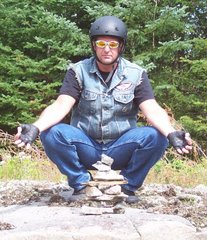Recording languages: Technology levels playing field
In this short vlog, Jay Krieger briefly extends his discussion in his previous vlog ASL can be Recorded! showing that through technology, recordkeeping is now equal for all languages.
Rambling philosophies of the complex life in the precious world we all share. A humble attempt toward a philosophical attitude, as one of composure and calm in the presence of troubles or annoyances.
In this short vlog, Jay Krieger briefly extends his discussion in his previous vlog ASL can be Recorded! showing that through technology, recordkeeping is now equal for all languages.

4 comments:
Jay, you made a good point. Now go back a bit in the history. We did use paper and pencil to record what was written but not the signs, that was correct but ASL was recorded on film, videotape, and pictures since their inventions. At end of Joey Baer's vlog about his presentation at Vlogging/Blogging conference at Gally, he included a clip of a man who was NAD president back in 1913 and his signing was captured on the black and white film.
What you have showed is that both text and ASL can be recorded simulateously with CD/DVD as opposed to using paper/pencil and film seperately. The process of recording deafhood have become simplified with technology evoultion.
P. S. I saw u at CAAD BB tourney last weekend but I didn't stop by to say hi since u was busy recording your team's stats! Recording is your passion!
Correction: Not CAAD BB tourney but WSAD BB tourney. My mind got warped at 11 pm! Sorry!
Interesting!
If you want taking MA or PH.D degree, you have to write dissertation? Right? Is it poss to do with DVD instead?
:-)
I humbly disagree with you to an extent.
What if there was an electromagnetic pulse that vaporized digital data everywhere? (Think WW III, for instance.) Or the far more mundane (and sadly, a common occurrence), there are HW breakdowns that result in loss of digital data? Even the CD/DVD media has a definite lifespan.
What if there are newer technologies that render previous digital data all but unreadable? Owners of 8" disks (or magentic tape) may disagree with you about the enduring value of the data stored herein.
George Veditz's ASL video, when he was a NAD president in 1913, largely survives today, thanks to it being 'printed' upon celluoid. If you want something enduring, old technologies usually can do the trick, and copies can be transferred onto digital media for reuse/viewing.
That all said, I would welcome the idea of an ASL repository of sorts, but I'm realistic about how long such stored data will last.
Post a Comment